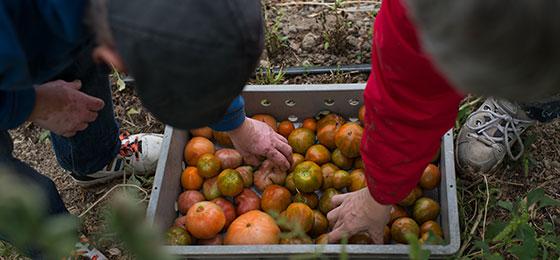Switzerland needs a Food Strategy for 2050

Our diet could be healthy while also being sustainable. The Swiss Food Strategy for 2050 will define the necessary targets and instruments.
Our diet could be healthy while also being sustainable. This is illustrated by the models developed for Switzerland's food system as part of the National Research Programme "Healthy Nutrition and Sustainable Food Production" (NRP 69). However, Switzerland needs a clear political strategy on healthy eating and sustainably produced food. To enable the food system to undergo a process of adaptation and transformation in the period up to 2050, the strategy must define targets and instruments. NRP 69, which was funded by the Swiss National Science Foundation (SNSF), provides various starting points for work on a 2050 Food Strategy.
Reducing food waste
Because Switzerland imports a large percentage of its food, around two-thirds of the environmental footprint associated with that food occurs outside the country’s borders. It is therefore important that the available food be used efficiently. Combating food waste is a first effective element in the process of reducing food-related environmental impact. Various projects undertaken as part of NRP 69 provide appropriate recommendations. For example, a certain amount of food waste could be reduced by modifying the aesthetic quality criteria for products, adopting new preservation methods or developing smart packaging.
Farmers as public health players
Eating less meat improves health and reduces the environmental impact caused by livestock farming. A second element of the 2050 Food Strategy should therefore address agriculture. However, the economic significance of meat and milk production must not be ignored. Subsidies should be available to compensate farming families for any losses caused by reduced meat consumption. Instead, the role of Swiss agriculture as a public health player should be strengthened. This could be achieved by intensifying support for domestic production of healthy foods such as fruit, nuts, vegetables and pulses.
Greater consumer involvement
Changed dietary habits must be built on public consent. For this reason, the 2050 Food Strategy should motivate consumers to take part in the political process. Consumer associations should be able to contribute to the drafting of guidelines on an equal footing with representatives of industry, agriculture or the catering sector. NRP 69 also recommends that the government extend the right of appeal to consumer associations and give them the right to file class actions.
Improvements along the food chain
Fourthly, the 2050 Food Strategy must promote the production, processing and distribution of healthy, sustainable food along the entire food chain. A number of NRP 69 research projects drew up specific recommendations on this issue, covering aspects such as farms, measures for reducing heavy metal contamination in soil, ideas for healthier eating at transport hubs or new approaches to combating deficiency diseases.
More information can be found on the website www.healthyandsustainable.ch.
- “Healthy and sustainable” website
- Synthesis report of the National Research Programme “Healthy Nutrition and Sustainable Food Production” (NRP 69)
